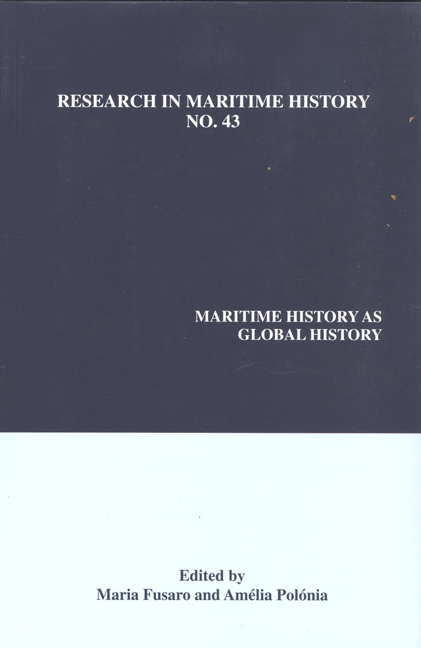Book contents
- Frontmatter
- Contents
- About the Editors
- Contributors' Notes
- “Maritime History: A Gateway to Global History?”
- “Behind the Atlantic Expansion: Flemish Trade Connections of Seville in 1620”
- “National and International Labour Markets for Sailors in European, Atlantic and Asian Waters, 1600-1850”
- “Maritime Expansion and (De)globalization? An Examination of the Land and Sea Trade in Seventeenth-Century Mughal India”
- “From Hold to Foredeck: Slave Professions in the Maritime World of the East India Company, c. 1660-1720”
- “Small Town Merchants, Global Ventures: The Maritime Trade of the New Julfan Armenians in the Seventeenth and Eighteenth Centuries”
- “Lighting up the World? Empires and Islanders in the Pacific Whaling Industry, 1790-1860”
- “Technological Advances in the Maritime Sector: Some Implications for Trade, Modernization and the Process of Globalization in the Nineteenth Century”
- “Lost in Calculation? Norwegian Merchant Shipping in Asia, 1870-1914”
- “Why Are the Major Oil Companies Selling Off their Fleets? The Case of Total”
- “Turning Maritime History into Global History: Some Conclusions from the Impact of Globalization in Early Modern Spain”
- “Maritime History as Global History? The Methodological Challenges and a Future Research Agenda”
“Maritime History as Global History? The Methodological Challenges and a Future Research Agenda”
- Frontmatter
- Contents
- About the Editors
- Contributors' Notes
- “Maritime History: A Gateway to Global History?”
- “Behind the Atlantic Expansion: Flemish Trade Connections of Seville in 1620”
- “National and International Labour Markets for Sailors in European, Atlantic and Asian Waters, 1600-1850”
- “Maritime Expansion and (De)globalization? An Examination of the Land and Sea Trade in Seventeenth-Century Mughal India”
- “From Hold to Foredeck: Slave Professions in the Maritime World of the East India Company, c. 1660-1720”
- “Small Town Merchants, Global Ventures: The Maritime Trade of the New Julfan Armenians in the Seventeenth and Eighteenth Centuries”
- “Lighting up the World? Empires and Islanders in the Pacific Whaling Industry, 1790-1860”
- “Technological Advances in the Maritime Sector: Some Implications for Trade, Modernization and the Process of Globalization in the Nineteenth Century”
- “Lost in Calculation? Norwegian Merchant Shipping in Asia, 1870-1914”
- “Why Are the Major Oil Companies Selling Off their Fleets? The Case of Total”
- “Turning Maritime History into Global History: Some Conclusions from the Impact of Globalization in Early Modern Spain”
- “Maritime History as Global History? The Methodological Challenges and a Future Research Agenda”
Summary
On Maritime History
Within the Anglophone world, maritime history in its widest sense has been – historically and indeed culturally – extremely sceptical of theoretical approaches. This probably descends on the one hand from the strength of its long-term popularity in British historiography, usually informed by a staunch dose of Anglo-Saxon pragmatism, and on the other from the long-standing and enthusiastic involvement in the discipline of former seafarers, understandably more concerned with investigating the history of operational and technological developments and with historicizing their contribution to their country's past than with more abstract forms of argument.
Moreover, maritime history has always enjoyed and often benefitted from a consistent and rich engagement of non-professional historians, and the lure of the narrative charms of swashbuckling adventures and derring-do has always enjoyed a large and loyal readership. From this descended a certain element of intellectual snobbery towards maritime history on the part of the historical profession, well matched – it needs to be added – by the reverse snobbery of seafarers, prizing above all the experience of having worked “hands on deck” and therefore being rather disdainful of any approach that does not demonstrate a proper appreciation of practical seamanship. The conflation of these two elements has long conspired to keep maritime history at the margins of the historical profession.
In the past two decades, however, maritime history has enjoyed a real renaissance and has entered into the mainstream of historical research. An increasing number of professional historians from several sub-disciplines (social, economic, political and cultural) have started to work on “maritime” issues and are increasingly joining professional associations connected with the study of the sea. Among the main reasons behind this phenomenon has been a general shift away from the production of strictly “national” histories and a growing engagement of professional historians with wider narratives. Both developments have demonstrated that “maritime history” can contribute a suitable stage for such narratives.
To describe briefly this historiographical “discovery of water,” it is very difficult to improve on Jerry Bentley's abstract for his seminal 1999 essay on “Sea and Ocean Basins as Framework of Historical Analysis:”
Since the mid-nineteenth century, historians have taken national states as the principal focus of their scholarship. […]
- Type
- Chapter
- Information
- Maritime History as Global History , pp. 267 - 282Publisher: Liverpool University PressPrint publication year: 2010



